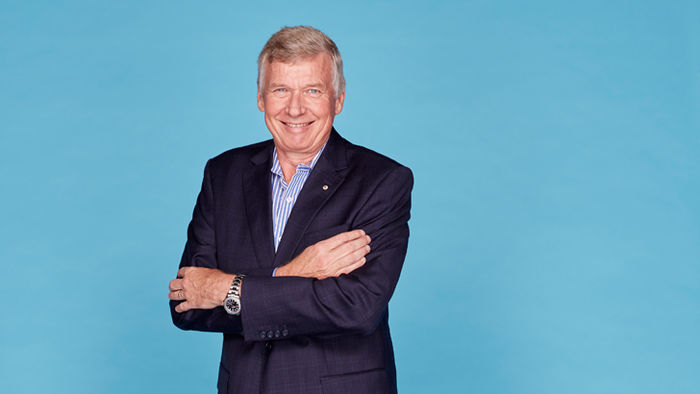The No. 1 retirement question you need to answer
By Paul Clitheroe
Back in 1982 I first started doing the occasional radio interview about money.
This led to TV interviews, small segments on shows like Midday and then to the Money TV show in 1993.
Money magazine was an offshoot of the TV show, which started in 1999.
I was 27 in 1982 and so I guess I should not be too surprised that I am getting a lot of questions along the lines of "How much money do I need to stop work?".
A whole bunch of viewers, listeners and readers have aged with me and with age we turn from working to make, save and invest money to pondering if we have enough!
I turn 63 this year and while I am delighted to focus a lot of my thoughts towards those of you in the work/invest/save stage of life, there are also those of you who have grown up with me and are looking at the lifestyle we can afford from our efforts.
The first problem my age group seems to have is answering my first question. "What amount do you need to spend each year for the lifestyle you want?"
This really puts the fox into the chook shed.
I tend to get much flapping and squawking but little sense of organisation.
Frankly, don't bother asking me, or anyone else, what lifestyle you can afford if you have not costed the lifestyle you want.
For heaven's sake, it is not hard. It is all your normal costs - home, cars, health and other fairly fixed stuff.

Then you add in your lifestyle plans: travel, hobbies like boats, golf or wine, maybe the costs of a holiday home. You need to add in replacing cars, gutters, home renovations and, if you are upgrading to business class travel, then that is great. Just write it all down.
If you have a well-discussed and documented lifestyle cost, we are on the way to getting this right.
For the sake of simplicity I am going to assume your lifestyle number is $100,000 a year. Yep, that is a very good lifestyle when you consider that at my sort of age the mortgage may well be paid off, the kids may be living at home but are likely to be adults and school fees are well behind you.
It is also much easier to clear $100,000 from investments and super than from work. Your tax rate will be much lower.
I also like this example as it is easy for every reader to do their own numbers. If you need $50,000 a year, it is half of $100,000. If you need $150,000, just add 50% and so on.
If you are my sort of age, plus or minus five years, my advice is to multiply your annual spending amount by 17. For $100,000 a year, this gives us a target of $1.7 million. And that is about what you will need in investment assets to fund $100,000 a year, plus CPI, for potentially several decades.
A bit of common sense helps here. If you had $1.7 million in a nicely diversified portfolio, history shows you would be likely to earn 4% to 5% above inflation.
So that would give you some $68,000 to $85,000 a year above inflation. You would need to take an extra $32,000 to $15,000 from your capital to get you to $100,000. That is not a big deal.
Your $1.7 million, based on earning 4% to 5% above inflation, would grow slowly but not at the pace of inflation. In other words, the real value of your money would drop as you moved into your 70s, 80s and 90s. What would the kids get?
The good news here is the house!
I've just realised that I am not going to have enough space here to do this issue justice. So I'll go for a two-part series.
That lets me treat this issue of "How rich do you want to be when you die?" with the depth it deserves. I'll leave the "6 feet under" joke alone.
You can go three ways with how rich you want to be when you die.
I appreciate you may not own a home, or you may want to sell it and go to the grave as you were born - flat broke.
I struggle with this one. I think nearly all of us want to leave at least enough for our funeral and if we have kids, nieces or nephews some money there would be nice.
It is also hard to go this path because to be flat broke at your date of death I need you to tell me that date.
Otherwise, you will have run out of money to live on; here at least you will get a pension.
The truth, however, is that those who care about money, such as readers of this magazine, always die too rich. It is hard not to. We spend decades building wealth; spending it feels unnatural!
Let's finish this month with a few observations. You need to decide where you fit.
1. You want to die with all your hard-earned money, plus inflation, to leave to your loved ones.
No problem. You should only spend the realistic long-term rate your money is likely to return. I am happy to call this 4% to 5% a year.
So if you want to spend $100,000 a year, I'd like you to have $1.8 million to $2 million in investments.
If you have this much, I think you will also own a home. That will grow above the rate of inflation, so when you are gone your loved ones will be very happy.
2. Well, that sounds as if I am leaving too much money. How about I spend whatever my money earns and leave the amount I have built up to my loved ones?
OK, that is a good plan. Because if you own a home, it will increase in value above inflation, so that, plus your investment capital, is a very generous estate.
That would mean you could spend the 4% to 5% your money would historically earn above inflation, plus our inflation allowance. Call this 7% to 8% a year.
So to spend $100,000 a year you'd need about $1.5 million.
Don't forget we need to grow your $100,000 spending money with inflation so your lifestyle is maintained.
Get stories like this in our newsletters.



